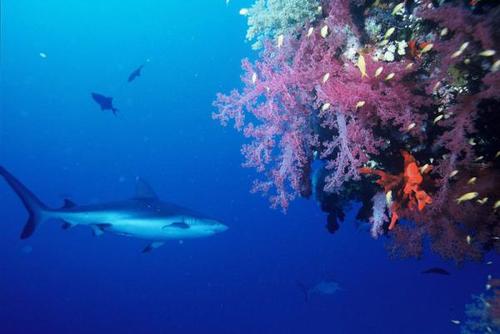Globally, and within Fiji, data is deficient for many shark species, which provides a barrier to effective management. Frontier’s research is based around the island of Beqa, recognised as a critical area for shark protection, yet in desperate need of further study.
The aim of this shark project is to collect data on the diversity of sharks in Fiji. This data will be used to feed into our ongoing research, but also the work of key organisations such as WWF (World Wildlife Fund) and The University of the South Pacific, who are working hard to better understand shark populations in the area. Armed with this information, Frontier is also working with local communities to raise awareness of the value and vulnerability of sharks and to increase protections locally.
Join us on our Fiji Shark Project, helping to determine the diversity and behaviour of these iconic, yet endangered species, contributing to the conservation of the world’s shark population.
WHAT DOES THE PROJECT DO?
The aim of Frontier’s shark project is to collect data on the diversity of sharks in Fiji. This data will be used to feed into our ongoing research, but also the work of key organisations such as WWF (World Wildlife Fund) and International Ocean Institute of The University of the South Pacific, who are working hard to better understand shark populations in the area. Armed with this information, Frontier is also working with local communities to raise awareness of the value and vulnerability of sharks and to increase protections locally.
To achieve this mission, we conduct scientific surveys on reefs occupied by sharks, investigating their diversity in relation to the marine ecosystems they inhabit. Alongside scientific data collection assembale we are working in the communities on Beqa to raise awareness regarding the ecological and economical value of sharks, helping them to protect those that inhabit their waters.
WHAT WILL I BE DOING?
The marine research and conservation programme is run in association with the University of the South Pacific. The work aims to provide the local stakeholders, research organisations and government bodies with the information they need to design and implement management plans for the future protection of shark populations and their habitat around Beqa island and lagoon.
To gather the data needed you will be diving in areas known to be frequented by sharks and studying their richness, abundance and behaviour through observational studies (if necessary you will learn to dive first). You will study the surrounding coral ecosystems, including coral, fish and invertebrate diversity, to determine what factors are contributing to changes in the shark population, such as, availability of food, pollution levels, fishing pressure and the health of the reef itself. Frontier's scientific research techniques are robust and proven in the field and include: roaming survey dives and line intercept transects for assessment of coral, fish and invertebrate.
In addition to working with the local shark populations you will also get the chance to carry out surveys on many ecologically and commercially important species of coral, fish and invertebrates, from colourful little nudibranchs to the exploited snappers and groupers. You will be part of surveys assessing the general health of marine habitats, such as assessment of coral bleaching, all being of great importance to local shark populations. Frontier is also working hard to assess the health of mangrove forests around Beqa.
This habitat is of great importance to coral reefs, maintaining water quality and clarity, filtering pollutants and trapping land sediment, whilst providing protection to the island from extreme weather events. The type of field work undertaken will depend on the time of year and the content of the research program when you join up and how long you are joining for. With so much to learn it's worth noting that those joining for only a few weeks will be training most of the time and may not get to do a lot of surveying.
Whilst diving, you'll see an extraordinary array of animals in addition to many species of shark, from turtle’s, to nudibranchs, sea cucumbers to feathery starfish, spiny urchins to octopus and jellyfish. When you motor out on the Frontier boats to distant dive sites you may even encounter gigantic manta rays, humpback whales or flying fish.
By the end of your project you will be expert in identifying many species of shark and will have in-depth knowledge regarding their ecology and conservation. You will also be able to identify vast numbers of colourful and patterned reef fish, marine invertebrates and coral, as well as being an experienced and competent diver. Although the work is intense and challenging you'll get immense satisfaction from contributing to the conservation of these iconic, yet endangered species . You will return home with the new friends you've made and a wealth of fascinating stories and memories.
You'll find your team to be a fun, dynamic mix of ages and experiences, with members who all share a passion about sharks, saving endangered marine life and travelling in developing countries. Your staff will be young, friendly individuals who are highly experienced in their field and many have volunteered on a Frontier project earlier in their career.


